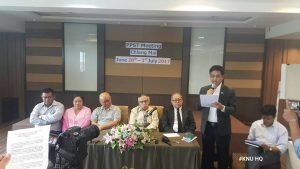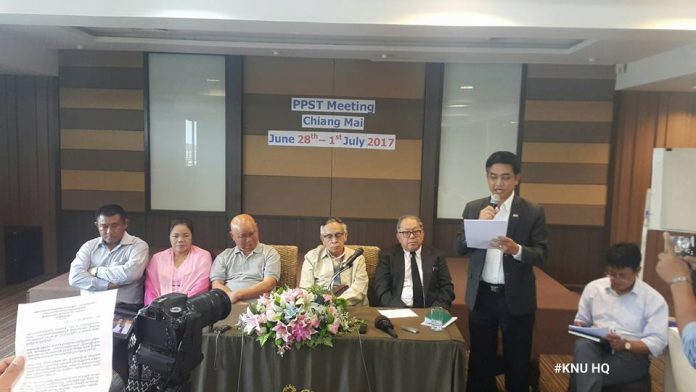Meeting this week in Chiang Mai, Thailand, leaders of national ceasefire signatory groups said that the government should stand by its commitment to Security Sector Reform (SSR) and not push armed ethnic groups towards the Demobilization and Disarmament (DDR) framework for peace. In remarks delivered to the media, Pu Zing Cung, Chairman of the Chin National Force (NCF) armed group said that the National Ceasefire Agreement (NCA) signatories were troubled by the direction of peace talks.

The NCA signatories’ Peace Process Steering Team (PPST) met from June 28 to July 2 to discuss the peace process, with a particular focus on the second round of the 21st Century Panglong Peace Conference held in late May. In a statement released after the meeting, the PPST said that it was reviewing the peace process in general, and the differences of interpretation between the armed ethnic groups, the government and the military of what the ceasefire agreement means. The statement said that there are weaknesses in the current process on the issues of freedom, equality and justice.
The United Nationalities Federal Council (UNFC), a coalition of armed groups that have not signed the NCA, had a similar debriefing congress on June 29, where they found significant problems with the state of the peace process. UNFC’s member groups were mostly absent from the recent round of peace talks because they are non-signatories.
During the peace talks, Senior General Min Aung Hlaing, the commander-in-chief of the Myanmar Armed Forces, sought to assuage concerns that the military, also known as the Tatmadaw, was altering its position.
“I would like to reiterate again clearly that the NCA is not a surrender agreement for the armed ethnic groups,” he said at the May 24 session.
He added, though, that democratic countries generally do not settle political differences with weapons, and that the decision about whether to pursue Security Sector Reform or Demobilization and Disarmament would come later, after further negotiations.
Of over 20 armed groups active in Myanmar (Burma), only eight have signed the NCA. Many of the other groups, some of which are actively fighting the military, are split between the UNFC and another coalition, the Northern Alliance.

